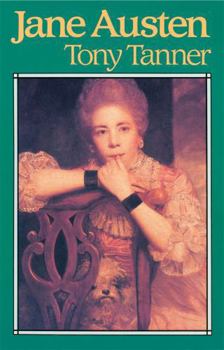Jane Austen
Select Format
Select Condition 
Book Overview
Devoted fans and scholars of Jane Austen--as well as skeptics--will rejoice at Tony Tanner's superb book on the incomparable novelist. Distilling twenty years of thinking and writing about Austen, Tanner treats in fresh and illuminating ways the questions that have always occupied her most perceptive critics. How can we reconcile the limited social world of her novels with the largeness of her vision? How does she deal with depicting a once-stable society that was changing alarmingly during her lifetime? How does she express and control the sexuality and violence beneath the well-mannered surface of her milieu? How does she resolve the problems of communication among characters pinioned by social reticences?
Tanner guides us through Austen's novels from relatively sunny early works to the darker, more pessimistic Persuasion and fragmentary Sanditon--a journey that takes her from acceptance of a society maintained by landed property, family, money, and strict propriety through an insistence on the need for authentication of these values to a final skepticism and even rejection. In showing her progress from a parochial optimism to an ability to encompass her whole society, Tanner renews our sense of Jane Austen as one of the great novelists, confirming both her local and abiding relevance.Format:Paperback
Language:English
ISBN:0674471741
ISBN13:9780674471740
Release Date:November 1986
Publisher:Harvard University Press
Length:291 Pages
Weight:0.90 lbs.
Dimensions:0.9" x 5.5" x 8.3"
Related Subjects
Biographical Biographies Biographies & History Biography & History Criticism & Theory Education & Reference English Literature Ethnic & National Europe Gender Studies History & Criticism Irish Literary Criticism Literary Criticism & Collections Literature Literature & Fiction Modern (16th-21st Centuries) Movements & Periods Politics & Social Sciences Renaissance Social Science Social Sciences Specific Groups Wales Women Women's StudiesCustomer Reviews
3 ratings
Thought Provoking
Published by Thriftbooks.com User , 19 years ago
I recently read a Penguin edition of Sense and Sensibility with an introduction by Tony Tanner. It was my enjoyment of that piece that made me seek this book out. Each chapter analyzes one of Austen's books, the unfinished Sanditon included. The introduction, with the assertion that in writing about civility Austen was really writing about civilization, and situating her work in its social and political climate, was particularly challenging. This broader picture was most welcome. I also liked how Dr. Tanner quoted and refuted Austen's detractors, and how he compared her stylistically to other authors of the era.
A glimpse of the author through her works...
Published by Thriftbooks.com User , 24 years ago
Jane Austin was a Tory. She was born in 1775, the year of the American Revolution, lived through the French Revolution, the Jacobin 'Terror' and the Age of Napoleon, and died just after Waterloo. The quiet English countryside she knew and loved became imperiled by many factors during her lifetime. Tanner, a reader at Cambridge, has written an insightful literary criticism about the seven novels Austen wrote (Sandition was incomplete at the time of her death). His book is written for the 'close' reader of Austen's work. I was introduced to his text in one of my courses on Austen.For example, in his chapter on 'Mansfield Park' Tanner lays out the underpinnings of the story as one of conflict between the order of the rural countryside (Mansfield Park) versus the disorder of Portsmouth and the corrupting influence of London. Various characters stand for these places as well as the moral failings of society. The three sisters Mrs. Price (lust) represents Portsmouth, Mrs Norris (envy) and Mrs. Bertram (sloth) represent Mansfield Park on the verge of breakdown. The Crawfords (avarice) interlopers from London, reprent the alluring but treacherous ways of urban life. Fanny, Edmund, and Mr. Bertram represent the ordered rural life. When asked what "Mansfield Park' was about, Ms. Austen replied it was about "ordination." The word ordination comes from the Latin word--ordo. Tanner says Ms. Austen, concerned "with the problem of how a true social order could be maintained, particularly in a troubled period, clearly considered the role of the clergyman as being of special importance." Tanner says Mansfield Park is loaded with symbolism. For example, on a group walk Fanny stays on the straight and narrow path by remaining stationary on a bench, while Edmund and Mary Crawford walk the Serpintine path. Maria and Julia stray from the cultivated garden into the "wilderness" behind the iron gate with Henry Crawford. Fanny Price wears an amber cross, a gift from her beloved brother William. She hangs it on a gold chain given her by Edmund. Wearing these two gifts over her heart gives her "inner peace." Fanny is the center of the story. Although many readers may perceive her as a prig, she is a very complex character. She is Austen's source of Good Orderly Direction. At the end, Mr. Bertram the "lord" of Mansfield Park recognizes her as his "true" daughter.
An excellent study on Jane Austen's novels
Published by Thriftbooks.com User , 25 years ago
This book is an interesting and insightful analysis on Jane Austen, her novels and her social and ideological milieu. After an introductory chapter on Jane Austen in relation with the Novel, Society, Education and Language, Tony Tanner dedicates the next chapters to a detailed study on Jane Austen's novels, including the incomplete Sandition. Tanner is highly effective in relating the historical, social and artistic circumnstances in Austen's time and how they influence the main themes and values present in her novels. As a result, the reader is able to have a clearer picture of Jane Austen and the evolution of both her writing style and her perspectives of society and the human person. Tanner has a clear style of writing, never losing the interest of the reader. A great work for the literary scholar and the general reader.





